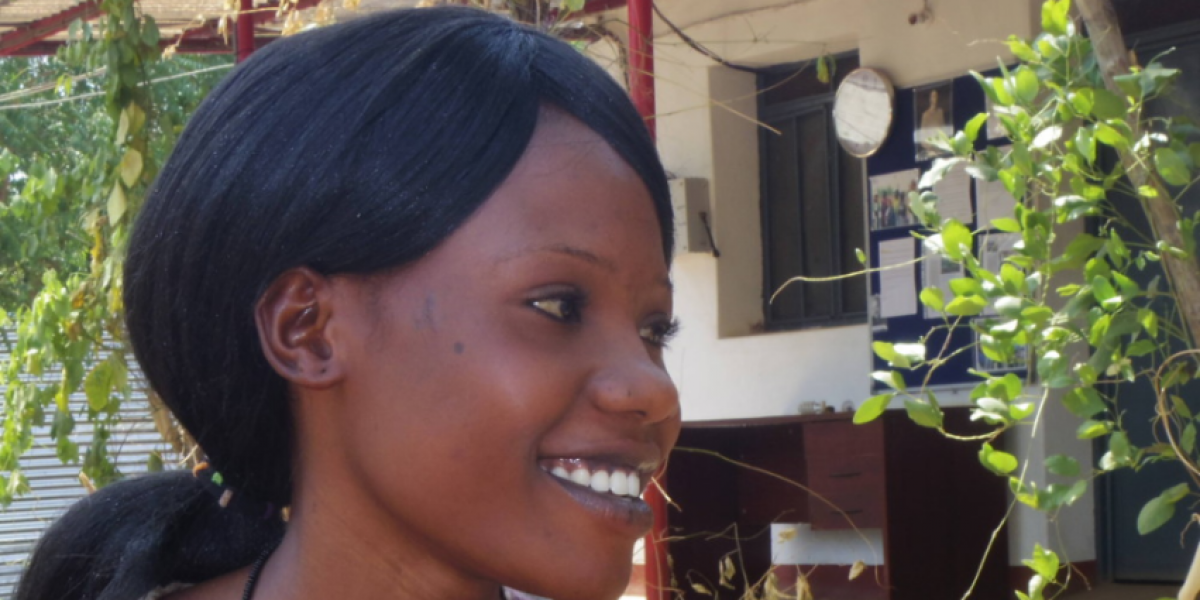
Maban is located in the furthest corner of the northeast of South Sudan. It is a very isolated area and the refugee camp is inaccessible at times because of armed conflict in the region. JRS has been responding to the call for education from refugees and internally displaced persons since 1992, when it first established schools in refugee camps in northern Uganda, and later expanded its work to increase access to education in four sites in what was then southern Sudan.
Sarah’s Story
Sarah Phillip lives with her family in Bunj, the county capital of Maban. Her home is just a few hundred metres from the JRS Field Office, and more than 600 kilometres from the country’s capital, Juba.Three years ago, when she was only 17, Sarah was married off by her family while she was in sixth grade, but her marriage made it difficult for her to proceed with her education. She is currently in her second year of the JRS Adult Literacy Program, despite pressure from her husband who was initially against her enrolling.
Sarah joined the JRS English Program with the hope of increasing her level of proficiency in the language. She hoped that this would improve her understanding of subjects in primary school, which she rejoined last year. In most parts of South Sudan, there are no trained teachers. The language of instruction is officially English, Arabic is so dominant in Maban County that this is the language in which most subjects are taught, yet the national examinations are set in English. For this reason, among others Sarah decided to join the JRS program.
She sat her South Sudan Primary Leaving Examination in December last year and now awaits her results. If the security situation remains stable, she will join secondary school this year and eventually sit her final examinations in 2021. Like many young people her age, Sarah’s vision of her future brims with optimism. “I want to be a doctor when I finish school”, she says confidently, adding that her goal is to help her community. In a society where child marriages are the norm and women are looked down upon, Sarah has managed to beat the odds to continue with her education.
Sarah’s story is far from unique. Many more girls have to overcome insurmountable obstacles just to access basic education. JRS introduced a female-only English language course in June of last year, to address the challenges facing women in the greater Maban County. By enrolling as many women and girls as possible, this course can have a significant impact on their performance and success in primary school.
Rahab’s Story
18-year-old Rahab* is among the 81 women who have successfully completed the course so far. She enrolled in August 2017 and graduated in December. She is now in the sixth grade in one of the public primary schools in Bunj. Her decision to enroll in the course was motivated by the difficulties she experienced in grasping concepts in class where the untrained teachers mostly used Arabic to teach their subjects. Rahab now feels confident that she will complete her education, and is determined to continue the English course until she completes the remaining four levels.
Although Rahab is happy with the course, she decries the long distance she has to travel to reach the JRS ‘Arrupe Learning Centre’, which is approximately six kilometers from where she lives with her parents. “The distance to the centre is too long to walk there four days in a week” she says. This means that she and many others who access the centre for both the English and Computer Courses travel an average of 10 kilometers a day, four days a week. To encourage participation, JRS has been offering transportation to a few female participants, although it is not possible for them to accommodate everyone who needs this assistance, they are trying to close this gap.
Girls’ Education in South Sudan
South Sudan has proportionately fewer girls going to school than any other country in the world. According to estimates, less than one percent of girls complete primary education, and just one in four students is a girl. The country has the highest female illiteracy rate in the world, making the programs run by JRS to increase the opportunities for girls to get an education vitally important.
Apart from English courses, JRS Maban also offers a certified Teacher Training Program, Computer courses and Psychosocial activities including counseling and daycare for children living with disabilities.



